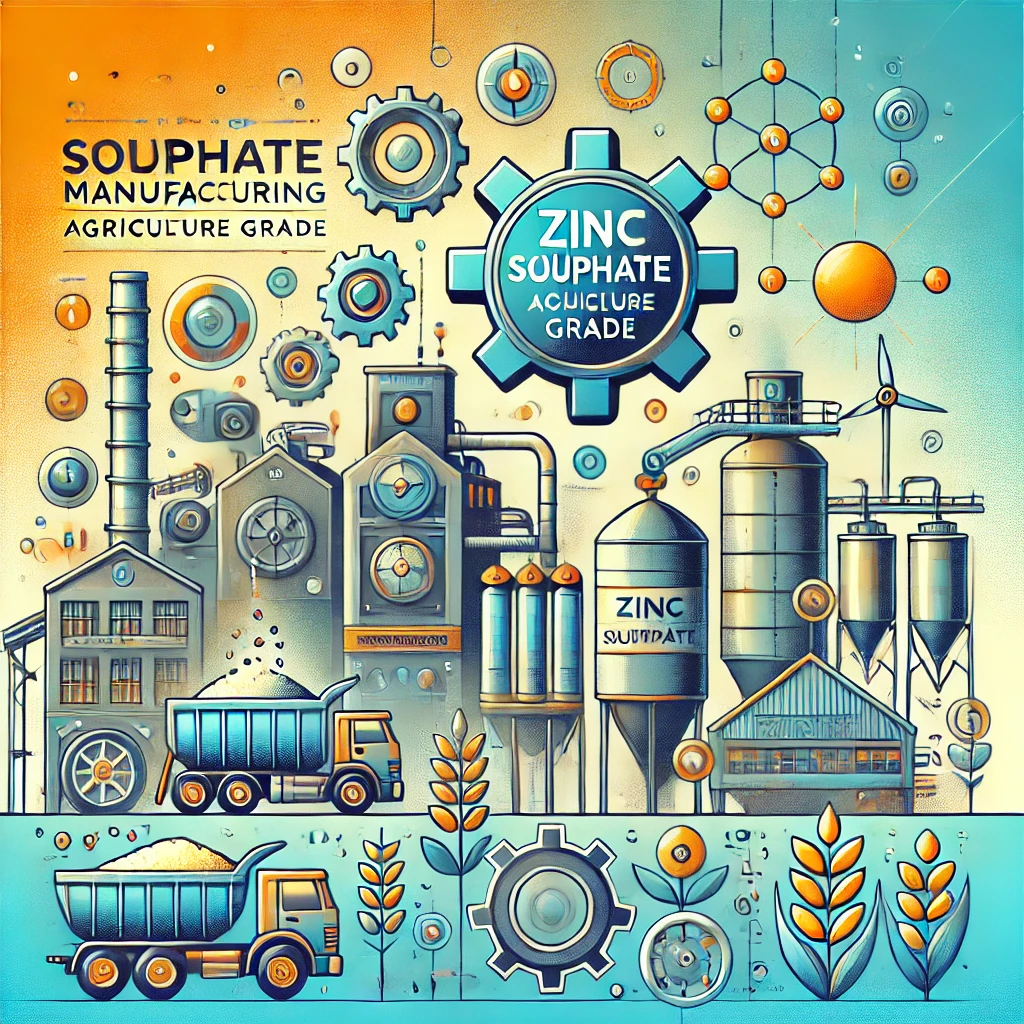Starting a zinc sulphate agriculture grade manufacturing business in India offers significant profit potential due to the rising demand for this essential agricultural input. This guide explores essential steps, including market analysis, licensing requirements, raw material sourcing, and setting up your manufacturing unit. Learn why zinc sulphate is critical for crop productivity and how it helps correct zinc deficiency, allowing you to capitalize on this growing market.
Key Takeaways
- Zinc sulfate is a vital micronutrient for crops, significantly enhancing growth and productivity by correcting zinc deficiencies in soils.
- The Indian zinc sulfate market is projected to grow robustly, driven by agricultural demand, urbanization, and the pharmaceutical sector, with a CAGR of 10.7% from 2020 to 2026.
- Starting a zinc sulfate manufacturing business requires careful planning, including obtaining necessary licenses, sourcing quality raw materials, and implementing effective marketing strategies.
- Preparing a detailed project report is crucial for planning and investment, as it provides comprehensive documentation on business plans, industry trends, market research, feasibility studies, and overall project economics.
Understanding Zinc Sulphate and Its Importance

Zinc sulfate (ZnSO4) is a chemical compound that appears as a colorless crystalline solid in its anhydrous form. It is highly soluble in water and can be found in various hydrated forms, including hexahydrate and heptahydrate. Zinc is a crucial micronutrient, significantly influencing plant growth and development. Despite being required in minimal amounts, zinc sulfate plays a key role in regulating various metabolic activities in plants and contributes to the synthesis of auxins, which are growth-regulating hormones.
A deficiency of zinc can negatively impact flowering and fruit development, resulting in delayed maturity and lower quality yields. Zinc sulfate is widely used to correct zinc deficiencies in crops, ensuring optimal growth and productivity. Addressing zinc deficiency in agriculture not only leads to higher yields but also improves soil nutrition.
This compound is not only beneficial for plants but also serves multiple purposes, including its use in rayon production, as a dietary supplement in animal feeds, and as an ingredient in fertilizers.
Knowing how zinc sulfate benefits agriculture is crucial for market entrants. The main role of zinc sulfate is to provide zinc to crops, essential for enzyme activation and protein synthesis. Furthermore, zinc sulfate enhances soil nutrient levels, cementing its role in modern farming.
Market Analysis for Zinc Sulphate in India

India’s zinc sulfate market is expected to grow at a CAGR of 7.2% over the next ten years. Increasing urbanization and rising rural incomes are propelling agricultural growth, thereby boosting zinc sulfate demand to supply zinc for essential nutrients in crops and livestock. With about 58% of India’s population depending on agriculture for their livelihoods, the demand for inputs like zinc sulfate remains substantial.
The Indian zinc sulfate market is expected to grow at a CAGR of 10.7% from 2020 to 2026. Heightened agricultural demand, pharmaceutical sector growth, and affordable production costs are key growth drivers. Strong agrochemical sector demand boosted the global zinc sulphate market in India in the last quarter of 2023.
Robust agricultural activities in India fueled positive market sentiments during this period. Manufacturers focused on clearing existing inventories instead of starting new production due to rising raw material costs, especially for sulphuric acid.
Currently valued at approximately $1.82 billion, the global zinc sulfate market is projected to hit about $2.92 billion by 2032, reflecting a CAGR of 5.5% from 2024 to 2032.
Identifying Your Target Market
Target market identification involves segmenting consumers by shared characteristics, needs, or behaviors related to zinc sulfate use. An effective approach is to set criteria for the ideal customer and narrow down the segments until one group remains. For example, crops like corn and edible beans respond better to zinc application in zinc-deficient soils.
High phosphorus levels from fertilizers can cause zinc deficiencies, especially in calcareous soils. Soil erosion increases the need for zinc fertilizers as it depletes nutrient-rich topsoil.
Applying zinc sulfate to the soil is the most common method for treating zinc deficiencies. Zinc sulphate monohydrate is a specific product that addresses zinc deficiencies effectively. Focusing on these specific segments allows businesses to tailor marketing strategies to their unique needs.
Essential Licenses and Permits
Several key licenses and permits are required to start a zinc sulfate manufacturing business in India. Businesses must first register as a legal entity and obtain a business registration certificate from relevant authorities. Obtaining environmental clearance is mandatory to ensure compliance with regulations when setting up a zinc sulfate manufacturing plant. A detailed project report is essential for obtaining necessary approvals, as it provides comprehensive documentation on business plans, industry trends, market research, feasibility studies, and overall project economics.
ISO certification is crucial as it demonstrates adherence to international quality standards. Besides standard licenses, industry-specific permits may be needed based on production processes and chemical usage. Securing all necessary licenses and permits is vital for establishing a compliant and successful manufacturing operation.
Acquiring these licenses involves steps like submitting applications, undergoing inspections, and providing necessary documentation. Consulting legal experts or industry consultants is advisable to navigate this complex process efficiently and avoid legal pitfalls.
Sourcing Raw Materials
High-quality raw materials are crucial for consistent zinc sulfate production. Primary raw materials include zinc metal or zinc oxide, sulfuric acid, and water. Reliable supply chains ensure a steady supply and help maintain production schedules. During the production process, zinc oxide hydroxide forms as an intermediary when heating a mixture of zinc oxide and sulfuric acid.
Zinc sulfate can also be zinc sulphate produced from water and sodium compounds like soda ash or natural ammonia-based materials. Strong supplier relationships and favorable terms enhance manufacturing efficiency and cost-effectiveness.
Monitoring raw material quality is important to ensure the end product meets industry standards.
Manufacturing Process Overview
Zinc sulfate manufacturing involves methods like roasting and leaching, flash chlorination, and thermal decomposition. Roasting and leaching can process zinc ores with up to 0.5% sulfur content. This method treats zinc concentrates with chlorine gas, converting zinc sulfide into zinc chloride, which is then extracted as zinc sulfate.
Thermal decomposition involves heating zinc sulfate to high temperatures, breaking it down into zinc oxide and sulfur dioxide for further processing. Selecting the appropriate method based on resources and requirements is crucial for an efficient manufacturing process. Zinc sulfate is also essential in the zinc plating process, where it is used in electrolytic baths to improve corrosion resistance and surface finishes.
Setting Up Your Manufacturing Unit
Selecting the right location for your zinc sulfate manufacturing unit is crucial. Consider factors like proximity to raw materials, transportation infrastructure access, and availability of skilled labor. Land acquisition should consider future growth potential and compliance with zoning and environmental regulations.
A factory license from local authorities is essential to legally operate a manufacturing facility in India. Compliance with the Factories Act and other labor regulations is necessary for the manufacturing unit’s legitimacy. Key machinery includes reactors, crystallizers, and filtration equipment, each contributing to different manufacturing stages. For assistance, consultancy services are available at 106-E, Kamla Nagar, Opp. Mall ST, New Delhi-110007, India.
Setting up a zinc sulfate manufacturing unit can cost between 10-50 Lakhs, depending on machinery selection and land acquisition. Investing in the right equipment and infrastructure ensures efficient production and long-term success.
Quality Control and Safety Measures
Quality control and safety measures are crucial in zinc sulfate manufacturing. Raw material suppliers often emphasize quality control and adherence to industry standards. Plant layout should optimize workflow and ensure compliance with safety regulations.
Zinc sulfate is chemically stable but should be stored in cool, dry conditions to avoid moisture exposure. Prolonged exposure to zinc sulfate powder can irritate the eyes and respiratory system. Zinc sulphate monohydrate, in particular, requires strict quality control to ensure its effectiveness and safety.
Strict quality control and safety measures help maintain high product standards and ensure worker safety.
Marketing and Sales Strategies
Effective marketing strategies are crucial for promoting zinc sulfate in agriculture. Segmenting the market by type and application tailors marketing strategies to specific consumer needs, including addressing zinc deficiency in crops to enhance productivity and soil nutrition. Zinc sulfate demand is rising in the pharmaceutical sector due to its essential role in medical applications.
The India Zinc Sulfate market is expected to grow at 8.9% annually over the forecast period. Rising agricultural demand, pharmaceutical sector expansion, and affordable production costs with readily available raw materials are key growth drivers. The uses of zinc sulphate are increasingly seen in fertilizers for its effectiveness in enhancing germination rates, promoting root development, and boosting crop yields.
Increased health awareness has significantly raised demand for zinc sulfate nutritional supplements, driving growth in this market segment. Companies in the zinc chemicals sector use agreements and contracts to broaden their customer base. Effective distribution channels for zinc sulfate include direct sales to farmers and partnerships with agricultural suppliers.
Financial Planning and Investment
A comprehensive business plan and detailed financial forecasts are crucial for attracting funding and guiding investment decisions in a zinc sulfate business. A detailed project report is also essential for presenting comprehensive documentation related to the manufacturing and industrial aspects, which can attract potential investors. Ongoing operational costs should be carefully evaluated alongside initial setup expenses to ensure financial viability.
Operating expenses for a zinc sulfate production facility include fixed costs, variable costs, and overheads, which must be accounted for in financial projections. Break-even analysis is crucial to determine the sales volume needed to cover total costs in a zinc sulfate manufacturing operation.
Revenue projections should account for market demand fluctuations and pricing strategies.
Benefits of Zinc Sulphate in Agriculture

Zinc is crucial for both plant growth and human health and development. Zinc is recognized as the third most critical nutrient for crop development due to widespread soil deficiencies in India. Zinc is essential for enzyme function, impacting metabolic reactions vital for plant growth.
Using zinc sulfate in fertilizers maintains soil zinc levels, essential for optimal plant growth. Zinc sulfate helps correct zinc deficiency, which is notably prevalent in specific regions, making them key targets for zinc sulfate marketing efforts. Rising farmer awareness about the benefits of micronutrients, including zinc, enhances the potential customer base for zinc sulfate.
Technological advancements in zinc sulfate application allow for better targeting of specific crop needs and regional deficiencies. Highlighting zinc sulfate’s essential role in fertilizers can enhance branding efforts. Educational content about zinc sulfate’s benefits in agriculture can drive consumer interest and boost sales.
Case Studies and Success Stories
Hindustan Zinc significantly impacts India’s zinc production, accounting for around 80% of total output. With over 78% market share, Hindustan Zinc holds a leading position in India’s zinc industry. The introduction of Air Cooled Condensers at Roaster V marked a significant innovation, achieving up to 95% reduction in water usage compared to traditional water-cooled systems.
The facility’s finished products are now certified as environmentally friendly, supporting its goal of reaching net-zero carbon emissions by 2050. The Pantnagar Metal Plant has successfully transitioned to using entirely green power for its operations. During the production process, zinc oxide hydroxide forms as an intermediary step, which is crucial for understanding the chemical reactions involved in zinc sulfate production.
These case studies highlight the importance of sustainability and innovation in the zinc sulfate market.
Summary
In summary, starting a zinc sulfate manufacturing business in India presents a lucrative opportunity, given the increasing demand for zinc in agriculture and other sectors. By understanding zinc sulfate’s importance to correct zinc deficiency, analyzing the market, and following the essential steps for setting up your manufacturing unit, you can position yourself for success.
Remember to focus on quality control, effective marketing strategies, and financial planning to ensure your business thrives. With the right approach, you can contribute to addressing zinc deficiencies in crops and support the growth of the agricultural industry in India.
Frequently Asked Questions
What components are required to manufacture Zinc Sulfate?
To manufacture Zinc Sulfate, you need water and sodium compounds like soda ash or ammonia-based materials. These components are essential for the production process. During the production, zinc oxide hydroxide forms as an intermediary when heating a mixture of zinc oxide and sulfuric acid.
What is the chemical formula for zinc sulfate?
The chemical formula for zinc sulfate is ZnSO₄.
What licenses may be required to start a zinc sulfate business?
To start a zinc sulfate business, you will likely need a Business Registration, Environmental Clearance, Fire Safety Certificate, industry-specific licenses, and ISO certifications (9001, 14001, and 45001). It’s essential to ensure all necessary licenses are obtained to operate legally and efficiently.
What is one use of Zinc Sulfate in agriculture?
Zinc sulfate is utilized in agriculture for foliar feeding, aiding plant nutrition by providing essential zinc and sulfur to the soil. This enhances plant growth and overall health.
What is the projected growth rate of the global Zinc Sulfate market from 2021 to 2028?
The global zinc sulfate market is projected to grow at a compound annual growth rate (CAGR) of 4.5% from 2021 to 2028. This growth reflects increasing demand across various applications.
Is zinc sulphate in demand in India?
Zinc Sulphate is in huge demand in India due to its use in agriculture to correct zinc deficiencies in soil and increase crop yields. Government initiatives and subsidies on micronutrient fertilizers and its applications in pharma and water treatment is driving the demand. The market is expected to grow at 8.9% CAGR with additional export potential to South Asia and Africa.
What is the agriculture grade of zinc sulphate in India?
In India, the agriculture grade of Zinc Sulphate includes Zinc Sulphate Monohydrate (ZnSO₄·H₂O) with 33% zinc and Zinc Sulphate Heptahydrate (ZnSO₄·7H₂O) with 21% zinc. These are used as micronutrient fertilizers to correct zinc deficiency in soil and promote better crop growth and yield. Fertilizer Control Order (FCO) in India has set the quality standards for these grades to ensure they meet the required purity and efficacy for agriculture use.
What is the manufacturing process of zinc sulphate?
Zinc Sulphate manufacturing process involves several steps primarily centered around reaction of zinc containing materials with sulphuric acid. Here’s a step by step process:
- Raw Material Preparation: Zinc ash, zinc ore or other zinc containing materials are collected and prepared. Zinc content in these materials is important as it affects the quality and yield of the final product.
- Reaction with Sulfuric Acid: Prepared zinc material is reacted with sulphuric acid (H₂SO₄) in a reactor. This reaction produces zinc sulphate and water as byproduct: Zn+H2SO4→ZnSO4+H2
- Filtration: The zinc sulphate solution is filtered to remove impurities or unreacted material to get pure solution.
- Crystallization: The filtered zinc sulphate solution is then cooled to get zinc sulphate crystals. Crystallization process can be controlled to get either zinc sulphate monohydrate or heptahydrate as per the product.
- Drying: The crystals are dried to remove excess moisture to get the required zinc concentration (33% for monohydrate and 21% for heptahydrate).
- Packaging: Dried zinc sulphate crystals are packed as per agriculture or industrial norms and dispatched.
This process needs to be controlled for temperature, acid concentration and other parameters to get consistent quality and yield of zinc sulphate.
